industry-academia
-
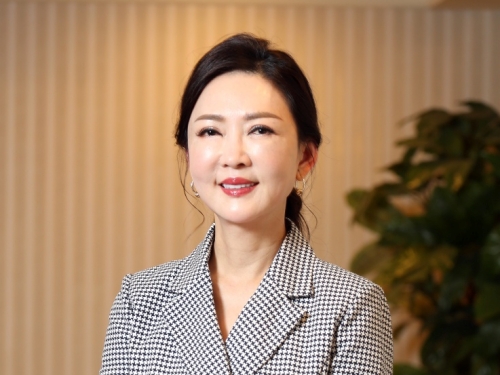 KAIST begins full-scale cooperation with Taiwan’s Formosa Group
< (From left) Senior Vice President for Planning and Budget Kyung-Soo Kim, and Professor Minee Choi of the Department of Brain and Cognitive Sciences of KAIST along with Chairman of Formosa Group Sandy Wang and KAIST President Kwang-Hyung Lee, and Dean Daesoo Kim of KAIST College of Life Science and Bioengineering >
KAIST is pursuing cooperation in the fields of advanced biotechnology and eco-friendly energy with Formosa Plastics Group, one of Taiwan's three largest companies.
To this end, Chairman Sandy Wang, a member of Formosa Group's standing committee and leader of the group's bio and eco-friendly energy sector, will visit KAIST on the 13th of this month. This is the first time that the owner of Formosa Group has made an official visit to KAIST.
Cooperation between the two institutions began last March when our university signed a memorandum of understanding on comprehensive exchange and cooperation with Ming Chi University of Science and Technology (明志科技大學), Chang Gung University(長庚大學), and Chang Gung Memorial Hospital(長庚記念醫院), three of many institutions established and supported by Formosa Group.
Based on this, Chairman Sandy Wang, who visits our university to promote more exchanges and cooperation, talked about ‘the education of children and corporate social return and practice of his father, Chairman Yung-Ching Wang,’ through a special lecture for the school leadership as a part of the Monthly Lecture on KAIST’s Leadership Innovation Day.
She then visited KAIST's research and engineering facilities related to Taiwan's future industries, such as advanced biotechnology and eco-friendly energy, and discussed global industry-academic cooperation plans. In the future, the two organizations plan to appoint adjunct professors and promote practical global cooperation, including joint student guidance and research cooperation. We plan to pursue effective mid- to long-term cooperation, such as conducting battery application research with the KAIST Next-Generation ESS Research Center and opening a graduate program specialized in stem cell and gene editing technology in connection with Chang Gung University and Chang Gung Memorial Hospital. The newly established cooperative relationship will also promote Formosa Group's investment and cooperation with KAIST's outstanding venture companies related to bio and eco-friendly energy to lay the foundation for innovative industrial cooperation between Taiwan and Korea.
President Kwang-Hyung Lee said, “The Formosa Group has a global network, so we regard it to be a key partner that will position KAIST’s bio and engineering technology in the global stages.” He also said, “With Chairman Sandy Wang’s visit, Taiwan is emerging as a global economic powerhouse,” and added, “We expect to continue our close cooperative relationship with the company.”
Formosa Group is a company founded by the late Chairman Yung-Ching Wang, the father of Chairman Sandy Wang. As the world's No. 1 plastic PVC producer, it is leading the core industries of Taiwan's economy, including semiconductors, steel, heavy industry, bio, and batteries. Chairman Yung-Ching Wang was respected by the Taiwanese people by setting an example of returning his wealth to society under the belief that the companies and assets he built ‘belonged to the people.’ Chang Gung University, Chang Gung Memorial Hospital, and Ming Chi University of Technology, which are pursuing cooperation with our university, were also established as part of the social contribution promoted by Chairman Yung-Ching Wang and are receiving financial support from Formosa Group.
2024.05.09 View 3833
KAIST begins full-scale cooperation with Taiwan’s Formosa Group
< (From left) Senior Vice President for Planning and Budget Kyung-Soo Kim, and Professor Minee Choi of the Department of Brain and Cognitive Sciences of KAIST along with Chairman of Formosa Group Sandy Wang and KAIST President Kwang-Hyung Lee, and Dean Daesoo Kim of KAIST College of Life Science and Bioengineering >
KAIST is pursuing cooperation in the fields of advanced biotechnology and eco-friendly energy with Formosa Plastics Group, one of Taiwan's three largest companies.
To this end, Chairman Sandy Wang, a member of Formosa Group's standing committee and leader of the group's bio and eco-friendly energy sector, will visit KAIST on the 13th of this month. This is the first time that the owner of Formosa Group has made an official visit to KAIST.
Cooperation between the two institutions began last March when our university signed a memorandum of understanding on comprehensive exchange and cooperation with Ming Chi University of Science and Technology (明志科技大學), Chang Gung University(長庚大學), and Chang Gung Memorial Hospital(長庚記念醫院), three of many institutions established and supported by Formosa Group.
Based on this, Chairman Sandy Wang, who visits our university to promote more exchanges and cooperation, talked about ‘the education of children and corporate social return and practice of his father, Chairman Yung-Ching Wang,’ through a special lecture for the school leadership as a part of the Monthly Lecture on KAIST’s Leadership Innovation Day.
She then visited KAIST's research and engineering facilities related to Taiwan's future industries, such as advanced biotechnology and eco-friendly energy, and discussed global industry-academic cooperation plans. In the future, the two organizations plan to appoint adjunct professors and promote practical global cooperation, including joint student guidance and research cooperation. We plan to pursue effective mid- to long-term cooperation, such as conducting battery application research with the KAIST Next-Generation ESS Research Center and opening a graduate program specialized in stem cell and gene editing technology in connection with Chang Gung University and Chang Gung Memorial Hospital. The newly established cooperative relationship will also promote Formosa Group's investment and cooperation with KAIST's outstanding venture companies related to bio and eco-friendly energy to lay the foundation for innovative industrial cooperation between Taiwan and Korea.
President Kwang-Hyung Lee said, “The Formosa Group has a global network, so we regard it to be a key partner that will position KAIST’s bio and engineering technology in the global stages.” He also said, “With Chairman Sandy Wang’s visit, Taiwan is emerging as a global economic powerhouse,” and added, “We expect to continue our close cooperative relationship with the company.”
Formosa Group is a company founded by the late Chairman Yung-Ching Wang, the father of Chairman Sandy Wang. As the world's No. 1 plastic PVC producer, it is leading the core industries of Taiwan's economy, including semiconductors, steel, heavy industry, bio, and batteries. Chairman Yung-Ching Wang was respected by the Taiwanese people by setting an example of returning his wealth to society under the belief that the companies and assets he built ‘belonged to the people.’ Chang Gung University, Chang Gung Memorial Hospital, and Ming Chi University of Technology, which are pursuing cooperation with our university, were also established as part of the social contribution promoted by Chairman Yung-Ching Wang and are receiving financial support from Formosa Group.
2024.05.09 View 3833 -
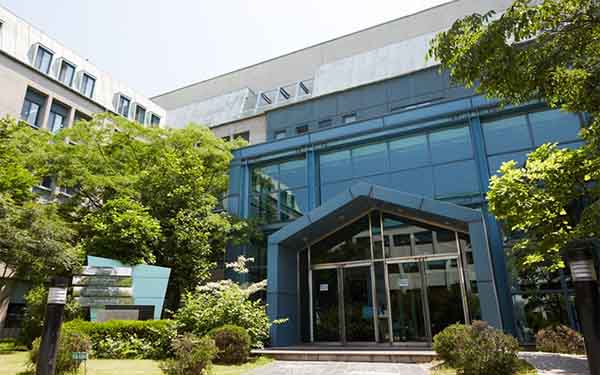 KAIST Earns AACSB Business School Accreditation
The KAIST College of Business re-earned business school accreditation from the Association to Advance Collegiate Schools of Business (AACSB) International. The school first earned the accreditation in 2003, and has continued to receive the accreditation four consecutive times. Currently only 5% of the 16,000 business schools around the world have earned AACSB accreditation. KAIST received a good evaluation for the competitive research of its faculty, its executive education programs based on strong industry-academia ties, and specialized MBA and master’s program, which includes programs such as social entrepreneurship and green business and policy.Alexander Triantis, dean of the Robert H. Smith School of Business at the University of Maryland and a judge for AACSB Accreditation said, “I was impressed to see students from KAIST have a high standard of knowledge. A number of its graduates continue to be appointed as professors of top universities abroad, which shows its strong global competence”. AACSB was founded in 1916 by deans of business colleges from prestigious universities such as Harvard University, Stanford University and Columbia University, to provide business and accounting accreditation to universities. Evaluation for AACSB accreditation takes place every five years. Schools are evaluated based on fifteen standards, including student admission and graduation requirements, student-faculty ratios, faculty’s intellectual contributions, research infrastructure, global cooperation, and industry-academia programs. They can be eligible for re-accreditation if they satisfy the conditions offered by AACSB International and are committed to continuous improvement every five years. KAIST also earned the accreditation from the European Foundation for Management Development Quality Improvement System (EQUIS) three consecutive times since 2010. In 2013, it earned membership into the Partnership in International Management (PIM). Membership is only possible for those who have AACSB and EQUIS accreditation and they can be listed as a candidate school through voting. The candidate schools can finally earn membership after one year of strict screening. As of January 2019, there are 65 prestigious graduate schools of business, including KAIST, listed as PIM members.
2019.02.01 View 5815
KAIST Earns AACSB Business School Accreditation
The KAIST College of Business re-earned business school accreditation from the Association to Advance Collegiate Schools of Business (AACSB) International. The school first earned the accreditation in 2003, and has continued to receive the accreditation four consecutive times. Currently only 5% of the 16,000 business schools around the world have earned AACSB accreditation. KAIST received a good evaluation for the competitive research of its faculty, its executive education programs based on strong industry-academia ties, and specialized MBA and master’s program, which includes programs such as social entrepreneurship and green business and policy.Alexander Triantis, dean of the Robert H. Smith School of Business at the University of Maryland and a judge for AACSB Accreditation said, “I was impressed to see students from KAIST have a high standard of knowledge. A number of its graduates continue to be appointed as professors of top universities abroad, which shows its strong global competence”. AACSB was founded in 1916 by deans of business colleges from prestigious universities such as Harvard University, Stanford University and Columbia University, to provide business and accounting accreditation to universities. Evaluation for AACSB accreditation takes place every five years. Schools are evaluated based on fifteen standards, including student admission and graduation requirements, student-faculty ratios, faculty’s intellectual contributions, research infrastructure, global cooperation, and industry-academia programs. They can be eligible for re-accreditation if they satisfy the conditions offered by AACSB International and are committed to continuous improvement every five years. KAIST also earned the accreditation from the European Foundation for Management Development Quality Improvement System (EQUIS) three consecutive times since 2010. In 2013, it earned membership into the Partnership in International Management (PIM). Membership is only possible for those who have AACSB and EQUIS accreditation and they can be listed as a candidate school through voting. The candidate schools can finally earn membership after one year of strict screening. As of January 2019, there are 65 prestigious graduate schools of business, including KAIST, listed as PIM members.
2019.02.01 View 5815 -
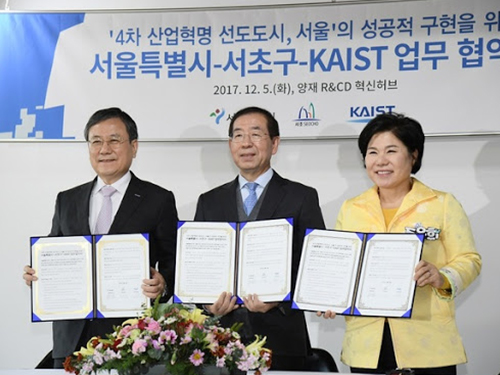 MoU by KAIST-Seoul-Seocho-gu for the 4th Industrial Revolution
The opening ceremony of the Yangjae R&CD Innovation Hub was held in Seoul on December 5. More than 400 guests came to the ceremony from major institutes and companies that are based in the hub. KAIST President Sung-Chul Shin, the Mayor of Seoul, Won-soon Park, and the Mayor of Seocho-gu, Eun Hee Cho, signed an MoU for Seoul to be the leading city for successfully realizing the Fourth Industrial Revolution.
The three organizations aim to cooperate with one another in various areas, including an economic boost for local job creation, technology development, and the promotion of projects through an industry-academia-institute network and fostering manpower.
Yangjae R&CD is the first facility specializing in and dedicated for Artificial Intelligence, which is the major topic of the Fourth Industrial Revolution.
The hub is comprised of enterprises specializing in AI, open co-work spaces, conference rooms, an open networking lounge, and spaces for fostering professional manpower. The hub will recruit additional enterprises and individuals who wish to move in. KAIST, an institute containing professors and researchers in the field of AI, and Modulabs, an organization becoming distinguished in AI research, will be in charge of operating the facility together.
The Yangjae R&CD Innovation Hub will operate a professional training program with participation from KAIST professors, which aims to produce 500 professionals in AI research and development by 2020. It will also provide inexpensive space as well as consultations and venture capital to startup and venture companies. It plans to find and foster 50 innovation companies by 2020.
In particular, the hub will operate a course for new AI business models 24 times over three years.
The hub also offers job consultations, academic conferences, public space for companies residing in the hub, a free GPU cluster server, technical training, seminars, forums, investment attraction, overseas expansion, and one-to-one technical consultations.
The Yangjae R&CD Zone is the place established for the Fourth Industrial Revolution by Seoul. R&CD is a concept combining Research and Development, Connection, Companies, Community, and Culture.
Seoul aims to create the Yangjae Zone as an urban innovation hub for facilitating industry-academia linkage as well as establishing a startup-settlement-growth technical ecosystem.
2017.12.11 View 9440
MoU by KAIST-Seoul-Seocho-gu for the 4th Industrial Revolution
The opening ceremony of the Yangjae R&CD Innovation Hub was held in Seoul on December 5. More than 400 guests came to the ceremony from major institutes and companies that are based in the hub. KAIST President Sung-Chul Shin, the Mayor of Seoul, Won-soon Park, and the Mayor of Seocho-gu, Eun Hee Cho, signed an MoU for Seoul to be the leading city for successfully realizing the Fourth Industrial Revolution.
The three organizations aim to cooperate with one another in various areas, including an economic boost for local job creation, technology development, and the promotion of projects through an industry-academia-institute network and fostering manpower.
Yangjae R&CD is the first facility specializing in and dedicated for Artificial Intelligence, which is the major topic of the Fourth Industrial Revolution.
The hub is comprised of enterprises specializing in AI, open co-work spaces, conference rooms, an open networking lounge, and spaces for fostering professional manpower. The hub will recruit additional enterprises and individuals who wish to move in. KAIST, an institute containing professors and researchers in the field of AI, and Modulabs, an organization becoming distinguished in AI research, will be in charge of operating the facility together.
The Yangjae R&CD Innovation Hub will operate a professional training program with participation from KAIST professors, which aims to produce 500 professionals in AI research and development by 2020. It will also provide inexpensive space as well as consultations and venture capital to startup and venture companies. It plans to find and foster 50 innovation companies by 2020.
In particular, the hub will operate a course for new AI business models 24 times over three years.
The hub also offers job consultations, academic conferences, public space for companies residing in the hub, a free GPU cluster server, technical training, seminars, forums, investment attraction, overseas expansion, and one-to-one technical consultations.
The Yangjae R&CD Zone is the place established for the Fourth Industrial Revolution by Seoul. R&CD is a concept combining Research and Development, Connection, Companies, Community, and Culture.
Seoul aims to create the Yangjae Zone as an urban innovation hub for facilitating industry-academia linkage as well as establishing a startup-settlement-growth technical ecosystem.
2017.12.11 View 9440 -
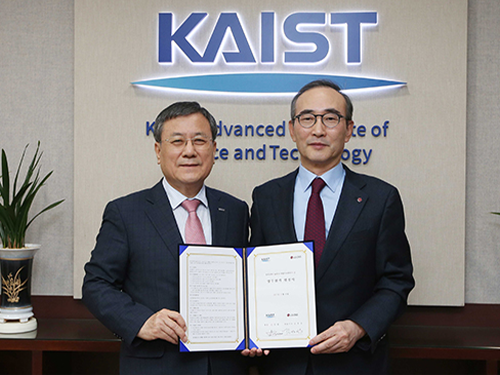 Strengthening Industry-Academia Cooperation with LG CNS
On November 20, KAIST signed an MoU with LG CNS for industry-academia partnership in education, research, and business in the fields of AI and Big Data. Rather than simply developing education programs or supporting industry-academia scholarships, both organizations agreed to carry out a joint research project on AI and Big Data that can be applied to practical business.
KAIST will collaborate with LG CNS in the fields of smart factories, customer analysis, and supply chain management analysis.
Not only will LG CNS offer internships to KAIST students, but it also will support professors and students who propose innovative startup ideas for AI and Big Data. Offering an industry-academia scholarship for graduate students is also being discussed. Together with LG CNS, KAIST will put its efforts into propose projects regarding AI and Big Data in the public sector.
Furthermore, KAIST and LG CNS will jointly explore and carry out industry-academia projects that could be practically used in business. Both will carry out the project vigorously through strong cooperation; for instance, LG CNS employees can be assigned to KAIST, if necessary. Also, LG CNS’s AI and Big Data platform, called DAP (Data Analytics & AI Platform) will be used as a data analysis tool during the project and the joint outcomes will be installed in DAP.
KAIST professors with expertise in AI deep learning have trained LG CNS employees since the Department of Industrial & Systems Engineering established ‘KAIST AI Academy’ in LG CNS last August.
“With KAIST, the best research-centered university in Korea, we will continue to lead in developing the field of AI and Big Data and provide innovative services that create value by connecting them to customer business,” Yong Shub Kim, the CEO of LG CNS, highlighted.
2017.11.22 View 11054
Strengthening Industry-Academia Cooperation with LG CNS
On November 20, KAIST signed an MoU with LG CNS for industry-academia partnership in education, research, and business in the fields of AI and Big Data. Rather than simply developing education programs or supporting industry-academia scholarships, both organizations agreed to carry out a joint research project on AI and Big Data that can be applied to practical business.
KAIST will collaborate with LG CNS in the fields of smart factories, customer analysis, and supply chain management analysis.
Not only will LG CNS offer internships to KAIST students, but it also will support professors and students who propose innovative startup ideas for AI and Big Data. Offering an industry-academia scholarship for graduate students is also being discussed. Together with LG CNS, KAIST will put its efforts into propose projects regarding AI and Big Data in the public sector.
Furthermore, KAIST and LG CNS will jointly explore and carry out industry-academia projects that could be practically used in business. Both will carry out the project vigorously through strong cooperation; for instance, LG CNS employees can be assigned to KAIST, if necessary. Also, LG CNS’s AI and Big Data platform, called DAP (Data Analytics & AI Platform) will be used as a data analysis tool during the project and the joint outcomes will be installed in DAP.
KAIST professors with expertise in AI deep learning have trained LG CNS employees since the Department of Industrial & Systems Engineering established ‘KAIST AI Academy’ in LG CNS last August.
“With KAIST, the best research-centered university in Korea, we will continue to lead in developing the field of AI and Big Data and provide innovative services that create value by connecting them to customer business,” Yong Shub Kim, the CEO of LG CNS, highlighted.
2017.11.22 View 11054 -
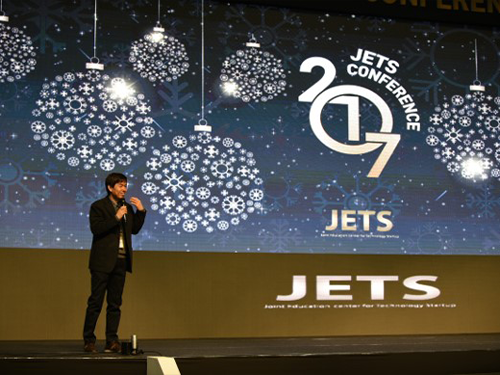 JETS Conference 2017
KAIST and four science and technology research universities in Korea co-hosted a technology start-up fair, the 2017 JETS (Job, Exhibition, Tech Forum, and Startup) Conference January 19 ~20 in the Ryu Geun-chul Sports Complex at KAIST.
Korea’s major science and technology research universities, Daegu Gyeongbuk Institute of Science and Technology (DGIST), Gwangju Institute of Science and Technology (GIST), Pohang University of Science and Technology (Postech), and Ulsan National Institute of Science and Technology (UNIST), held the event in a collaborative effort to educate, inspire, and connect young entrepreneurs, especially those who will launch technology start-ups.
The conference brought entrepreneurs and innovators together who seek ways of working with and supporting start-ups and for their sustainable growth. It also drew aspiring young students and researchers from universities and the government-funded research institutions who are in the process of commercializing their technology. Students from each university’s industry-academia cooperation program who incubated their technology and ideas were key contributors.
At the Tech Forum, entrepreneurship and technology consultation specialists including Joe Jasin, managing director at DNA Investment Partners in the US, the founder of Cyworld Dong-Hyung Lee, and Professor Hawoong Jeong, a complex bio-network specialist from the Department of Physics of KAIST lectured on the ecosystem of start-ups and its trends and development.
The Dean of University-Industry Cooperation at KAIST Joongmyeon Bae said, "We organized this event in collaboration with four major research universities to further encourage technology start-ups from young students and help their ideas and technology bear fruit. We will continue to strive to create an ecosystem of start-ups which works efficiently.”
(Above photo: Founder of the Cyworld, Dong-Hyung Lee gives a lecture at the Tech Forum. Below photo: Students visit exhibition booth of each participating institution.)
2017.01.20 View 11749
JETS Conference 2017
KAIST and four science and technology research universities in Korea co-hosted a technology start-up fair, the 2017 JETS (Job, Exhibition, Tech Forum, and Startup) Conference January 19 ~20 in the Ryu Geun-chul Sports Complex at KAIST.
Korea’s major science and technology research universities, Daegu Gyeongbuk Institute of Science and Technology (DGIST), Gwangju Institute of Science and Technology (GIST), Pohang University of Science and Technology (Postech), and Ulsan National Institute of Science and Technology (UNIST), held the event in a collaborative effort to educate, inspire, and connect young entrepreneurs, especially those who will launch technology start-ups.
The conference brought entrepreneurs and innovators together who seek ways of working with and supporting start-ups and for their sustainable growth. It also drew aspiring young students and researchers from universities and the government-funded research institutions who are in the process of commercializing their technology. Students from each university’s industry-academia cooperation program who incubated their technology and ideas were key contributors.
At the Tech Forum, entrepreneurship and technology consultation specialists including Joe Jasin, managing director at DNA Investment Partners in the US, the founder of Cyworld Dong-Hyung Lee, and Professor Hawoong Jeong, a complex bio-network specialist from the Department of Physics of KAIST lectured on the ecosystem of start-ups and its trends and development.
The Dean of University-Industry Cooperation at KAIST Joongmyeon Bae said, "We organized this event in collaboration with four major research universities to further encourage technology start-ups from young students and help their ideas and technology bear fruit. We will continue to strive to create an ecosystem of start-ups which works efficiently.”
(Above photo: Founder of the Cyworld, Dong-Hyung Lee gives a lecture at the Tech Forum. Below photo: Students visit exhibition booth of each participating institution.)
2017.01.20 View 11749 -
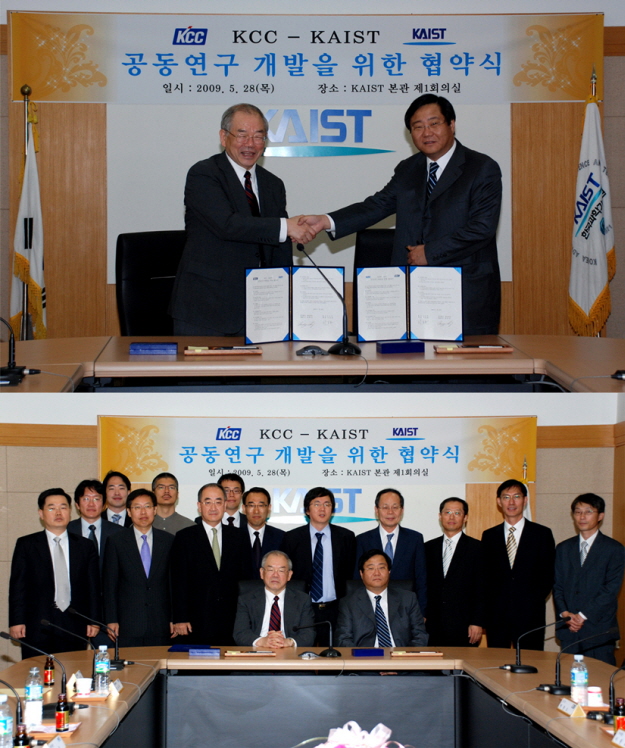 KAIST Signs Agreement for Industry-Academia Cooperation with KCC
KAIST signed an agreement for industry-academia cooperation with KCC, Korea"s leading supplier of building & industrial materials, on May 28, university sources said.
The agreement signed by KAIST President Nam-Pyo Suh and Mong-Jin Chung, Chairman of the KCC Business Group, calls for KAIST and KCC to conduct joint research for the development of new technologies in nano science, new materials areas and interdisciplinary areas.
Under the agreement, KCC will invest 5 billion won into the KAIST Institute for the NanoCentury over the next five years.
KCC Chairman Chung said: "Through this industry-academia cooperation agreement, we are seeking to give part of our profits back to community . We hope this agreement to contribute to the development of core technologies of the future in the new materials field, and nurturing specialized manpower."
2009.05.28 View 13495
KAIST Signs Agreement for Industry-Academia Cooperation with KCC
KAIST signed an agreement for industry-academia cooperation with KCC, Korea"s leading supplier of building & industrial materials, on May 28, university sources said.
The agreement signed by KAIST President Nam-Pyo Suh and Mong-Jin Chung, Chairman of the KCC Business Group, calls for KAIST and KCC to conduct joint research for the development of new technologies in nano science, new materials areas and interdisciplinary areas.
Under the agreement, KCC will invest 5 billion won into the KAIST Institute for the NanoCentury over the next five years.
KCC Chairman Chung said: "Through this industry-academia cooperation agreement, we are seeking to give part of our profits back to community . We hope this agreement to contribute to the development of core technologies of the future in the new materials field, and nurturing specialized manpower."
2009.05.28 View 13495